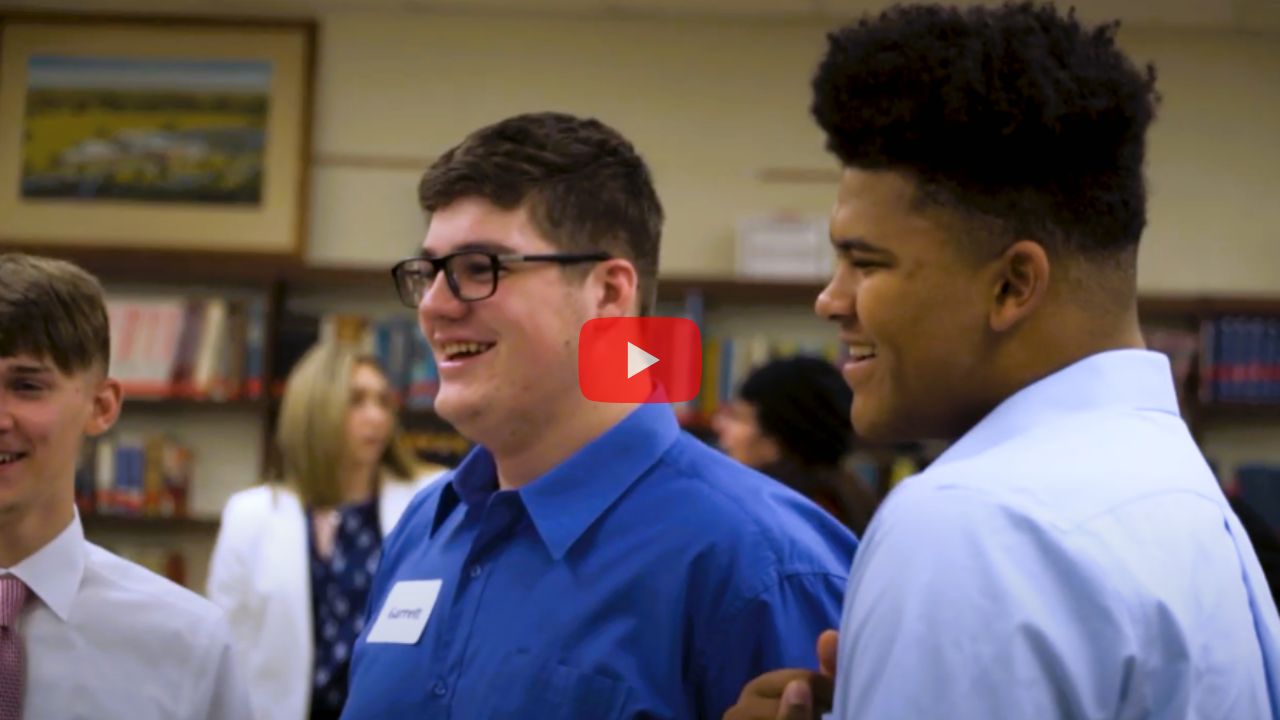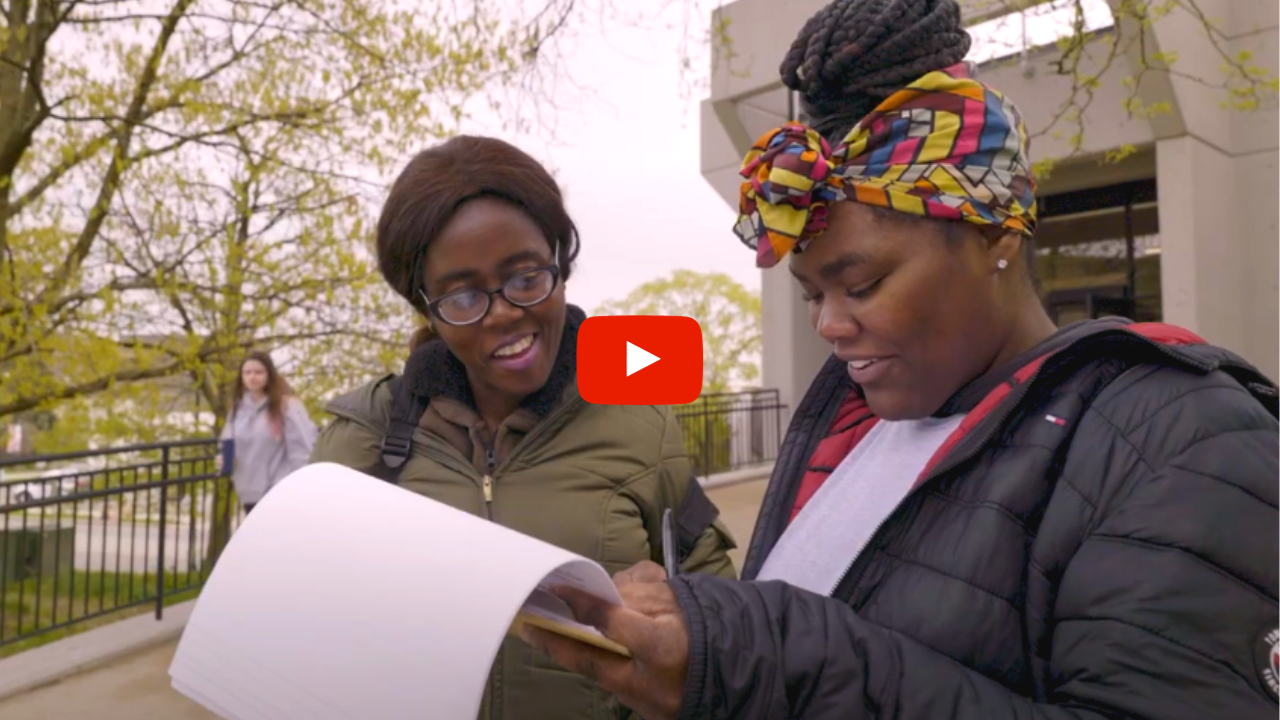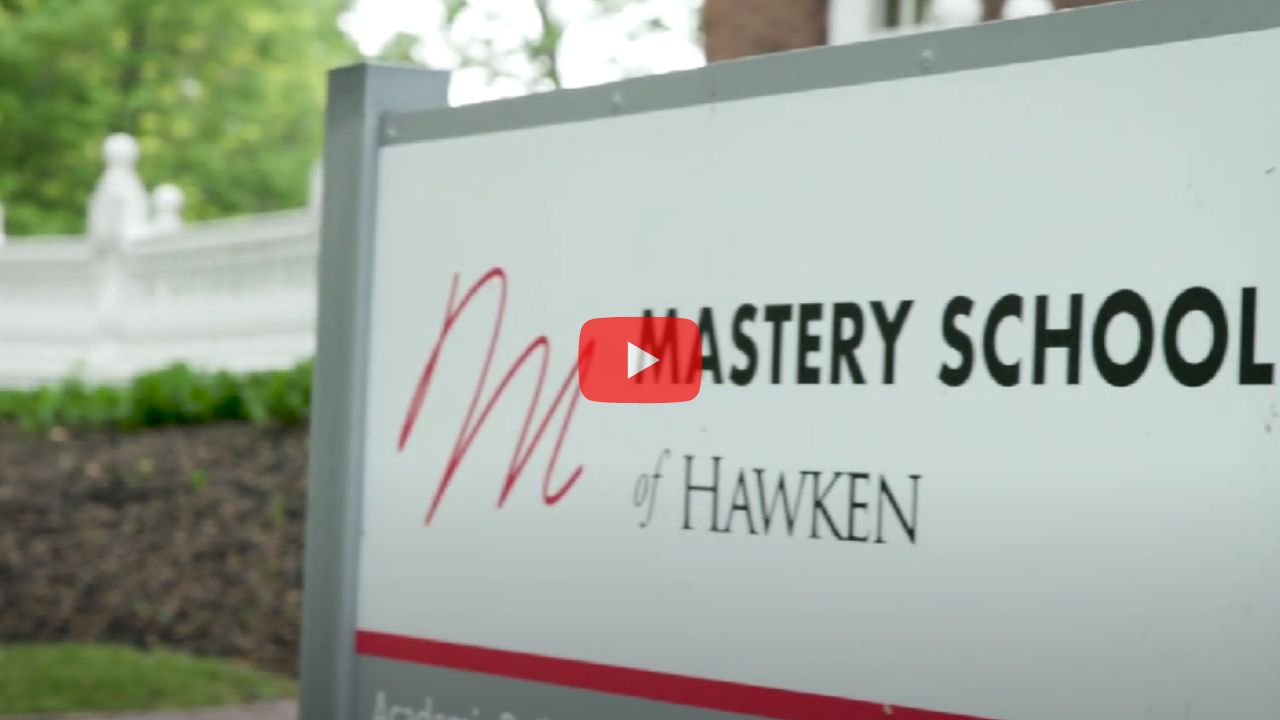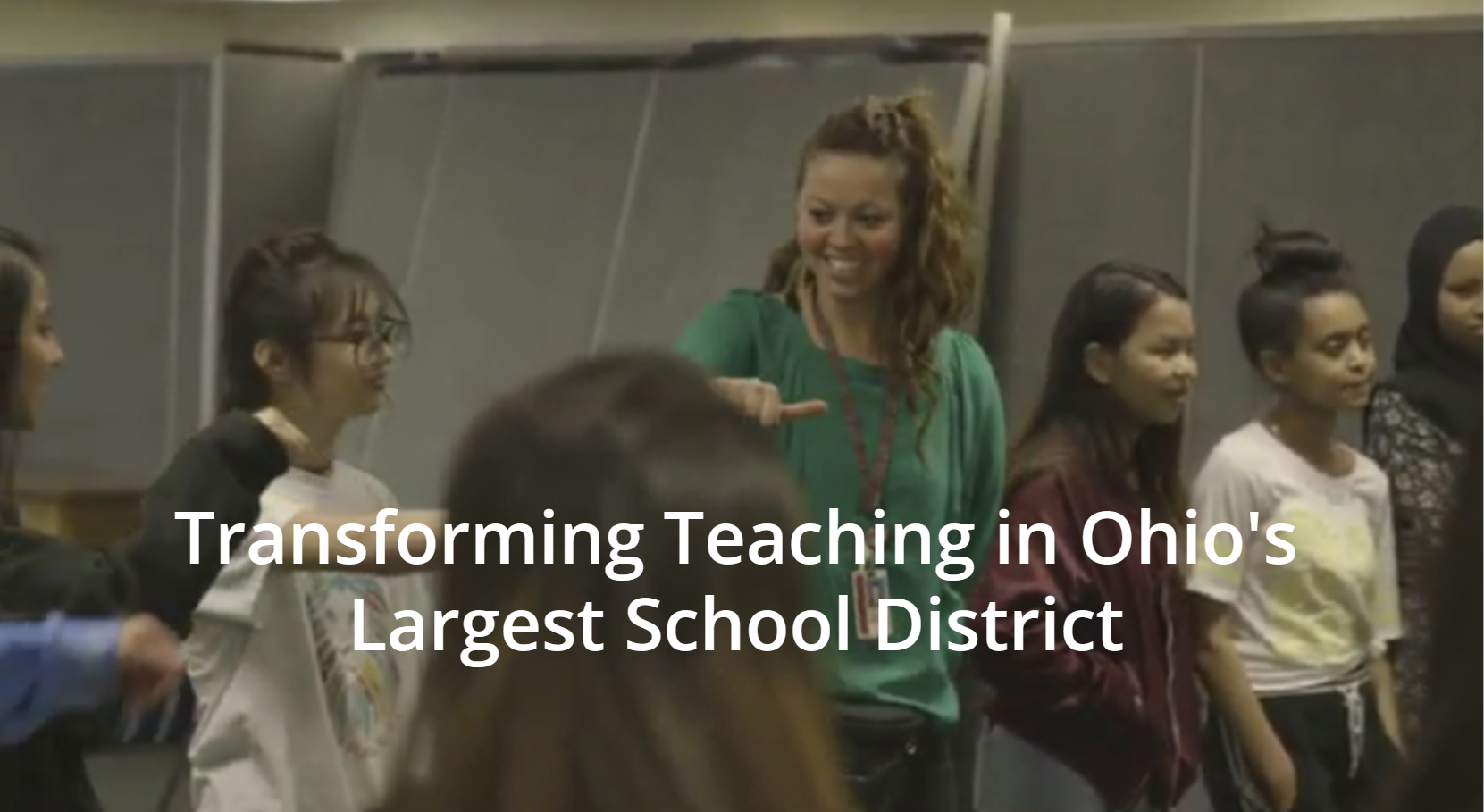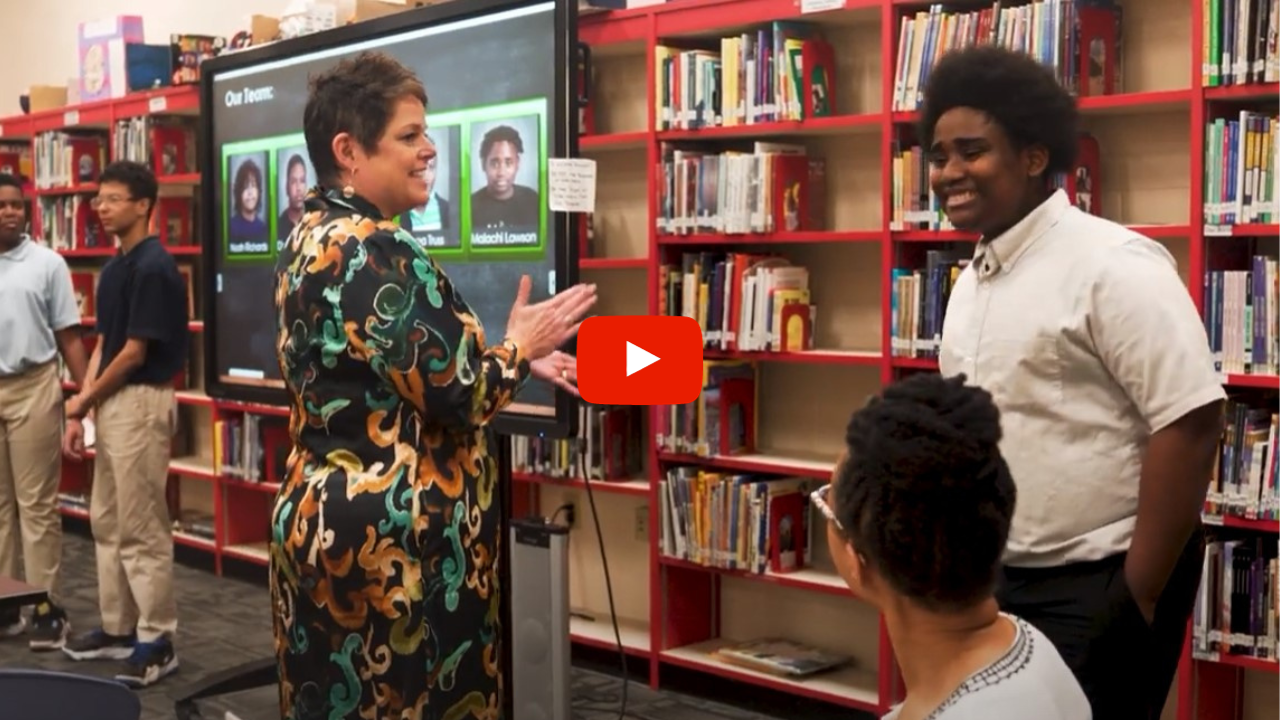In this episode, Doris talks to David Peden. David is the Chair of the Entrepreneurship Leadership program at Battle Ground Academy, a K12 independent school near Nashville, TN. They discuss the entrepreneurship education program he has built after attending an Educators Workshop for Entrepreneurial Studies.
Do School Better: A Podcast for People Who Want to Transform Education - Listen to more episodes here
Doris: Hi, David.
David: How are you?
Doris: I’m great. How are you?
David: I’m doing well.
Doris: Well, I’m really excited to hear about the program that you’re building and tell me all about it. So you came to the workshop. Which one was it?
David: It was California…
Doris: That’s right.
David: …at Steve’s ranch two, three years ago.
Doris: That’s right.
David: And we really, at the time, we were dipping our toe in entrepreneurship. And I was teaching an elective, “History of Entrepreneurship,” and that’s really where our program started. And it has really just…it has blossomed and grown, really, into something that…what we first thought was going to happen, it was nowhere near as powerful of a program as we currently have.
Doris: Oh, gosh. Well, I want to hear all about it. I actually think it would be interesting if you started with coming out of the worship. Sort of going from the start to now.
David: Sure. And we really had…we sit in Franklin, Tennessee just about 20 minutes south of Nashville. And it’s really…it’s a booming city in many ways. Growth is coming, but new business as well. We’ve had healthcare for a long time, obviously the music industry as well. But we have a lot of entrepreneurs.
And so, there were a few forces coming together at, really, the right time to say, “We need to offer in some form or fashion entrepreneurship.” We had some parents who were outside the building who said, “We have this desire.” I was looking for a way to really, to start to teach more true business courses. That was my background and I have an MBA and had been in business before education.
Then our head of school who was relatively new, he was in his second year. He also had a vision for doing more in entrepreneurship. And so, we came together and said, “How can we do this and how we can do this well?” And really, as we looked the workshop was really…and the Lean LaunchPad Method was we said, “Hey, we think they’re doing it really well. Let’s go see what they’re doing.” And came back…at the time, we taught one class, which was “History of Entrepreneurship,” a history elective. And as we came back, we said, “Let’s tear this apart and really see what we can do.”
And so, really, that vision said, “We can’t do exactly the same way that Hawken does,” which was one of the great things of the workshop. And that you said, you know, “Find a way to make this fit at your place and at your school.” And so, that’s what we really sought out to do. And so, we’ve created this four year program in entrepreneurial leadership, and one of the impacts…and we may talk more about it later, but of the workshop was, really, the power of leadership and communication as a piece of this.
And so, we poured in that leadership component, and we really…we look at it as “We’re going to fill their toolbox early, early on.” Our traditional speech class that all freshmen took, we revamped it and made it a speech leadership class.
Doris: Oh, interesting.
David: And so, all of our students are required to take that for graduation. They have been and continue to be. But that is now part of our EL department and program. And then from that point on, it’s really an elective track over the course of the next four years…next three years after their freshman year. So they have the opportunity to take the next courses, really, are intro to Lean LaunchPad which that’s where we…and it is still probably more traditional in its…somewhat in its delivery. But that’s where they learn the Lean LaunchPad method. That’s where they learn the Business Model Canvas. That’s where they’re watching the Steve Blank videos on Udacity in a flipped classroom environment.
The classroom experience is not traditional, I can say that. And that’s what’s really been exciting, is we really said, “Okay, how can we really approach this in a more ambitious teaching and learning style?” But they have that class. And then there’s some electives they could choose from. And really, they have to take two electives from a variety of course offerings, from micro and macroeconomics to the “History of Entrepreneurship” course that I mentioned, and a civic partnerships course which is “How does local government work?” right? If you want to accomplish something and get something through at the local level, how do you do that? And really, in a completely nonprofit way. And we try to balance the nonprofit and for-profit world in all we do, and really deliver with a sense of “How can this also tie into purpose and mission within that?” And that course is really geared towards the nonprofit world. This is the only one that’s really completely dedicated to that.

Doris: That’s interesting.
David: But then, if they choose to do that, they can then take our Capstone course, which is the only full year course, which is the senior year. And that is where they’re meeting the real business problems, meeting with the founders and CEOs, and working just like you do there in the Hawken course. And we do that again three times, and then they create have their own startup, have the Founders Day and all that.
So really, we took what we saw there at Hawken really stretched it out and put in some electives. And it is really powerful. And the students…this is the first year for us to have the full Capstone course and the students are just continuing to blow us away with what they can do and what they’re learning, and what they’re doing through this method, and through this approach.
Doris: Wow, that’s really impressive, David. So the students in that Capstone course now, they are juniors?
David: They are seniors.
Doris: Seniors.
David: So the Capstone course, we…this year, with it being the first kind of beta test, if you will, the Capstone, there is a junior in there. But we really want that to be a senior-level course…
Doris: That’s fantastic.
David: …with not just with the getting off campus and getting out of the building, but we really want that toolbox to be filled before we get to that point.
Doris: That’s really impressive. So as you take a step back from all of that, how would you describe the impact on, first, the students, and then I’d like to ask you to think about the impact on teachers and the school community.
David: Sure. You know, for students, it’s the empowerment, and that’s one of the big takeaways I came away from the workshop as well, but the empowerment of the students. And it’s this transition from a world where there’s one right answer and “How do I find that?” and “Give it to me.” “I need the parameters to tell me what I’m finding and I’ll go get it, and I’ll regurgitate it back to you.” But it really is that move from that learning environment to one where it is, “I’m really discovering this myself.” And the skills of “Okay, my teacher says…they may not even have this answer for this question that I’ve posed. How do I go find it? And then how do I validate what I believe? And what I’m holding is my hypothesis, or my theory of what I think is right. How can I validate that?” And really, watching them learn and grow, and the confidence that that builds within them to really be able to tackle anything that comes their way.
Doris: That’s phenomenal.
David: Absolutely.
Doris: And what, when you think about the impact this has had on teachers…
David: Well, for teachers first, I can speak for myself and those in the department. This has been a change for us as well. In teaching, I’ve been primarily economics and history in the classroom. And there was so much just content delivery. And the impact on me is seeing how if I can break away from that as well and really help set the parameters and give them problems and let them go rather than forcing my own thoughts and injecting myself into that many times, they can come back with far more powerful results than I ever could have imagined.
And really watching that happen, it’s transformed how I teach. Even in that intro course, you go from within that flipped environment of them learning this stuff through the videos…the method through the videos. Now when they come back into my classroom, the first semester, I wasn’t a very good teacher of it, and I regurgitated the lesson that Steve had to make sure that they got it. That was kind of my check And now, it is, “How can I engage them in such a way that they’re using this information? And really owning, taking ownership of the material and internalizing it themselves so they truly understand it. Not just that regurgitation?
So we as a department…first, I was really the lead teacher within that, but then also our whole department as we’ve added members of the teaching faculty to it, it’s had an impact on us. And the conversations we have with each other at the lunch table, in-between classes, before school, after school, it really has been some of the most rewarding…or some of the most rewarding moments of my teaching career of really saying, “Hey, let’s see how we can do this better, and how we can really be impactful.”
But I can tell you also that teachers outside the program…for the first year or so, they heard about it and there was this push. “Okay, how can we sprinkle some ‘entrepreneurship’ in there? Because that word is used so much and has so many different meanings.” And for a long time, you would see them say, “Hey, I’m doing this where we’re teaching them this about business, and this,” and it’s bigger than just business. And it’s really the skills in how they can do that.

And now, as our Capstone students are really reaching out across departments and they’re using much of the information they’ve had in other classes and going back to those teachers and they’re seeing the impact, I think it is having an effect on this campus. One of the terms we like to use with what we’re doing in entrepreneurship is, really, “applied liberal arts.” Because it is. It’s using many of the skills they’re learning in other classes. And so, when we say, “Okay, how can you validate your thoughts here? Your design, your prototype, now, let’s get out of the building and go test it.” Well, that’s very similar to if you’re writing an English paper, right?
Doris: Right.
David: “What is the supporting information of how you’re going support your thesis?” And so, there is a lot of carryover, and I think it is having an impact on how they’re approaching the “How to” in other facets on campus as well.
Doris: That’s wonderful. I think school should be teaching students how to think, not what to think.
David: Right.
Doris: And what you described is teaching and learning about…that gives students the skills when you talk about empowerment and giving them agency, the skills to learn and think about things critically. I wanted to…a couple of things you said triggered something for me that I want to ask you about.
So we’ve learned a lot in the last couple years of working with a lot of teachers and educators from all over as they’ve implemented their programs. And a few of the things…there’s a lot of excitement in what I’ll call “innovative education” around innovative education right now. And a lot of things being thrown out there: entrepreneurship, experiential education, PBL, all kinds of things.
And what you’re talking about, I love that you’re using the word “teaching” still. When I hear people in this space talk about being more a facilitator and a guide, I really don’t react well to that. Because I think this is immersive teaching. It’s just very different.
David: Right.
Doris: A very different experience. And what you said about what’s happening in your department, it just…in your experience, when I taught in more traditional classes, I never was a traditional teacher. But when I taught in more traditional classes, there was very little room in schools to collaborate as a teacher. And you brought up the collaborative piece. And I think that’s enormous. And I’d like you to, if you could, give a couple examples of how that’s making an impact at your school. How you see that collaboration.
David: Sure. One great example…and I may not illustrate as well if you saw it on a daily basis, but our other…the other teacher who teaches the “Intro to Lean LaunchPad” course, he and I both have graduate degrees in business and have both spent time in that world. And so, when we started teaching, I came back from the workshop, and again, just dove into the material and looking at the method, and really, “How can we make this the best thing?” I saw the difference between…where he and I were more similarly aligned in terms of our teaching styles, right? We both had…and he’s a great educator and has our students’ interest first and always has done that.
But then I saw the difference between where I had gone and, really, where he still was in terms of hammering that content. And the more that we were able to look and share…and he sat in on my classes, I sat on his classes and really began those discussions, it opened up this world of where he then was running with new ideas, and “What if we tried this?” “Hey, I did this today in class. It didn’t work well.” Or “I did this in class and it worked incredibly well.” And he just had a project that he brought into the classroom, which was really a lesson in leadership and leadership styles. And it was…he involved different roles within a group setting and really gave them some prompts to build a small structure out of Legos, and then they had to solve some problem with it. But using, injecting different leadership styles through prompts and so forth. And it was one of the best things I’ve seen in the classroom ever. And I’ve now taught for nearly 15 years, and it was maybe one of the best lessons I’ve ever seen.

Doris: Oh, wow.
David: And he, from where he came before, which was more this traditional, content-driven where he wanted to go over sales figures and cost structures, and analyze that, and how can you value a startup and then go forward and get venture capital? He was so ingrained in the weeds of that to where now, it’s really this bigger and more ambitious style that really teaches them those skills and the “How to” without getting in the way.
Doris: That’s great.
David: Yeah and I’ll say this, too. We both with the Capstone students, because he is in there some as well just as another set of eyes and ears as we’re teaching this, he and I have both thought, and it’s not been easy to inject ourselves in what where we think the group should go with a given business, you know? It’s easy for us to sit there and say, “Hey, we think we have the answer. We can see this and the students aren’t…they may not have the business background to see that maybe we can help.” And really, we’ve had to fight, but it’s been good and we’ve seen the reward of it of stepping back and saying, “No, they really have to do this on their own.” And they may go a different direction, but we need to let them do that, and we need to allow them the room to fail if it fails or succeed if it succeeds, and then pivot to a different direction on their own rather than cutting that off at the pass… if that makes sense.
Doris: Yeah, it makes total sense. You know, having taught content-driven courses and now teaching like this… When somebody says to you, “But wait. They’re learning skills, but they’re not really learning any content. How we can do that in a school?” I’d love to hear your answer to that.
David: Sure. And early on, you know, that was one of the big concerns of our school, which is…we’re in our 127th year as a school, and it has stood for a long time, and this community is really this pillar of great education. And when our students graduate, it’s this. And for a long time, it was rigor, rigor, rigor, and it still is, but in a more rich and truer way rather than maybe just loading with work.
Doris: It’s a different kind of rigor, right?
David: Absolutely.
Doris: I would say it’s at least as rigorous. It’s just different rigor.
David: I would say it’s much, much more rigorous. It’s rigorous…
Doris: I would agree.
David: …at a more in-depth level. And that’s the thing that I think people have started to see. And one example I use in the Capstone course…one of the businesses which was a custom tailoring business, they were just starting out. They were two lifelong friends. One had been somewhat in this business, another one had been in a family business, very successful in the Nashville business community. They left to go start their own custom tailoring business and were taking on a couple in that area. And one of their needs that was really going early on was they needed a website. They were pretty young into this and they needed a website for a lot of reasons.
Well, our students in the Capstone course jumped on that as one of the solutions that they needed. And on one of our check-ins on a Friday, they had said, “Okay, we’ve said they need a website, and here’s the website we’ve started building for them.” And one of the students in the course asked, “How did you come about in actually…in building this website?” And he said, “Well, I taught myself coding.” I’m like, “What?”
And so within two weeks, he saw the need to teach himself coding. I could have never taught him coding. But he did that to the point where he could create this beautiful and very functioning website for this company. And so, I was able to share that with the faculty members that if we had a class in coding, that may have taken maybe a full semester or a full year to get him to the level that he got in two weeks because he had this deadline looming and really was bought in and had ownership of this problem and wanted to solve this for them.
And so, that was something that he learned some content, some pretty heavy content in just one example of him going and doing that on his own rather than me sitting there and lecturing him on “This is how you code. Now, click this and that.” And he was able to do that himself.
Doris: Yeah, I think this is…what you’re talking about is enormous. A lot of people who aren’t close to this immediately think about this as “Oh, this is about business and its skills.” But this isn’t for the students who want to go the heavy-duty academic route and need to take the AP classes, etc.
We’ve worked with tons of teachers who are using these methods in science classes and humanities classes, and math classes. And I think that as you and others get iteration after iteration of practice, experimenting and building programs and seeing what the students can do, you’re going have students who teach themselves all kinds of content in the course of doing the work. And the coding is a great example, you’re right. You could have the kid in a year-long class, lecture-based class, and they probably wouldn’t learn as much.
David: Absolutely and it has. It’s had that impact already.
Doris: Do you see in the school…you mentioned some of the other teachers. Do you see other teachers in the school who are more single discipline-based teachers getting more open to the idea of trying these kinds of methods in their classes?
David: I do. One of the things…and I mentioned our new head of school. We also…we revamped our strategic plan within this same…in this same cycle, and actually just EL Program was added as one of the key components of that late in the game just because, already, people were seeing the power within it.
But one of the things we’ve gone to as a school is really saying, “Okay, let’s have an inquiry-based philosophy of learning and teaching within the school, and really unpacking what that means,” and obviously, that’s one teaching and learning style, can it can be. But I’m thankful that, really, our head of school and also our division head in the upper school have really embraced “Let’s go out and let’s try some different things.”
And so, while, yes, we’re inserting this program to the life of the school, this isn’t the only place where that’s happening. And so, we as teachers, and across the board, not just within our department, that really started a lot of the discussions between us as those teachers of “How could we do this and do this better?”
And so, we have a lesson plan fair, if you will, where teachers will go in in some of our professional development time set aside, and we’re actually teaching them and going through the lessons. And we’ve been fortunate to present two of…in two of those, and really, the feedback from other teachers has been that. “I can use this element in my classroom. I can use that element in my classroom.” How can I engage them within what we’re doing and partner with you? And really doing some projects.
In the history department, we’ve done so. Also, in the art department. And really, that was the bigger win because as Steve says, “Entrepreneurship should be taught more as an art class than even a business class.” And so, I think that’s when people’s eyes really started opening up.
Doris: That’s exciting.
David: We’re working with them. Absolutely.
Doris: I don’t know if you know, this has become…teaching this method has exploded the demand for it so much that I started a nonprofit recently called Wildfire Education, and what you just described is the reason that we’re calling it “Wildfire.” Because this tends to happen when teachers see the results in the students, and they want to try it.
The other thing I wanted to ask you about that because your program, David, is so impressive. And what I would love to hear your thoughts about are for the teacher who doesn’t have a business background and has been teaching for several years and doing it in a pretty traditional classroom. But what you can tell them about…it can be very intimidating to the idea of starting this and I think it’s all about experimenting and trying just like it is for the students. What would you say to a teacher like that who’s a little intimidated after hearing about your impressive program?
David: Sure. I appreciate your kind words on that. Really, in some ways, I think one of the bigger blocks to both John and myself who are heavy into the business side of this, we did have the business background, and that actually I think created some hurdles for us to have to get over to kind of free our minds from “This is how we learned it in graduate school,” or this method or that method. I think we really had to step back and kind of untangle some of that ourselves before we could really go.
And so, I would say in many ways, that teacher’s at an advantage because they don’t have that, that hang up to get through, right?
Doris: Yeah.
David: And it can be applied…it transcends business. We are working with businesses and nonprofits…any organization. But the method can be applied to many different things. And really, the thing…and this is a key to all of learning and really, I think, getting back to why most of us got in education in the beginning, because we do love lifelong learning, and that is…and we love students, it’s being free to fail. And really, free your mind of that. I think that goes with anything, any new endeavor you really try to reach out and do. If you’re constantly worried about that fear, “What if I don’t succeed?” and you don’t stretch yourself and fail, you’ll never truly learn and grow through that.
And so, I think that’s the biggest hurdle to get over for anybody is really freeing your mind. And we preach it, we have the Samuel Beckett quote up on our wall in our EL, our main EL classroom of “Ever tried. Ever failed. No matter. Try again. Fail better.” And we really want people to embrace…we talk about embracing failure and embracing ambiguity within our program of “We may fail, but we’re going to learn a new way to do something.” That’s the quote when he created the light bulb.
Doris: That’s awesome.
David: Yeah. I didn’t find one light bulb. I found however many different ways not to do a light bulb and that taught me how to do it.
Doris: That’s awesome. And what I try to do in these workshops is give everybody what they need to be able to start. Have a pilot. Give them all the methods and the starting point. But everybody, after the first pilot, people create their own and build their own. And it’s just a starting point.
I love the program that you’ve built and what you’re doing, and I really hope you’ll keep in touch, and I want to come down and see the program in action.
David: Absolutely. We’d love to have you and likewise. It really has been exciting to be able to be a part of it. And to that point, too, this started with just a simple history class.
Doris: Yeah.
David: And I saw light bulbs go off with students when we were able to kind of delve in some of the nontraditional ways, which now with the support of the school around us and the leadership, it has really, like you said, taken like wildfire, and it has been exciting.
Doris: That’s wonderful. Well, I can’t wait to see what you do next,
David. Thank you so much.
David: Awesome. Thank you.
If you are interested in learning more about our training, visit our workshop page on Wildfire Education to learn more.


